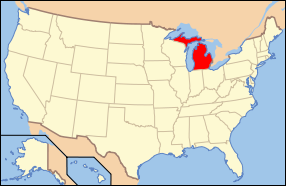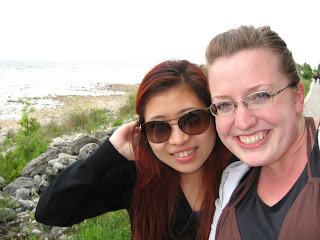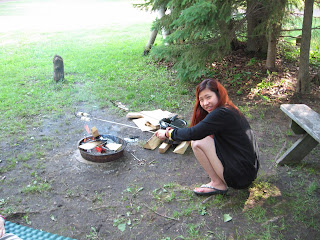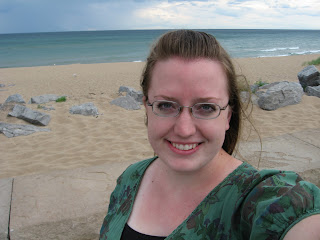It was the sort of thing you really don't want to be late for: a fireside with an apostle in which you are conducting the music and are therefore supposed to be sitting on the stand.
We had piled into the car and begun our journey with a decent amount of time to spare. I was carpooling with two friends, April and Lydia. As arranged by the lovely and wonderful sister missionaries of our ward, we were to pick up two investigators to bring with us to the Young Single Adult/Single Adult fireside with Elder Bednar, which was scheduled to begin at 7pm at our Stake Center in Saline, MI.
A couple of minutes before 6:15, April, Lydia, and I pulled into the Institute parking lot, where we were to meet our first investigator. We parked and waited, passing the time by observing a very unabashed squirrel scurrying around and digging for nuts in the flowerbed next to our parking spot. At 6:15, right on time, our investigator rode up on her bike. The missionaries arrived at the exact same moment, so we chatted with them for a second and introduced ourselves to the investigator. The investigator climbed into our car (April's black Ford Focus named Toothless [How to Train your Dragon, anyone?], which incidentally has nothing to do with this story, but is a fact that nonetheless deserves to be shared) and then we were off. As we were leaving, I had a small thought in the back of my mind that I ought to check with April to see if we had the next investigator's phone number so that we could call him when we arrived at his apartment, but for whatever reason, I didn't voice my thought aloud. A couple of minutes away from the Institute, however, sense did get the better of me, and I sent a quick text to the missionaries asking for the phone number, just in case.
We were headed to North Campus to a ritzy [and by ritzy, I mostly mean "ridiculously expensive"] complex called the 'Courtyards.' As I had been to the Courtyards many times and have several friends who live there, we had no trouble locating the large complex or finding the particular building we needed. However, it was then that we realized we didn't have our investigator's exact apartment number. And in a building so large and with such high security, this was quite problematic. The missionaries had not yet responded to my text, so I asked April if she had the investigator's phone number. She thought she did, but when she checked the text the missionaries had sent her, like me, she only had the address, and of the address, she also lacked an apartment number. In fact, when it came right down to it, neither of us even knew our investigator's last name.
No panic necessary yet, I thought. I'll just give the missionaries a ring. I found their number in my phone's address book and dialed. The phone rang. And rang and rang. And then it went to voicemail.
So I tried again.
And again.
And then again.
Then April tried.
Still no luck.
By this time, I was beginning to feel the panic rise. Ditching an investigator was the last thing I wanted to do. But being late to a fireside with an apostle was also the last thing I wanted to do. So...what to do?
I tried dialing the missionaries yet again. Please pick up, please pick up, please pick up, I thought silently.
Voicemail again.
"Shall we just go?" April asked.
I said a silent prayer. Please, Heavenly Father, please please let the missionaries answer their phone.
"Let me try one last time," I said aloud.
I dialed.
The phone rang. And rang.
And then one of the sisters answered.
Relief flooded through me. I quickly got the investigator's phone number from them, and then I called him. He answered after the second ring. After spending a couple of minutes with each of us trying to figure out where the other was, we found him. As it turned out, he had already been waiting outside, but on the opposite end of the complex.
As we sped out of the parking lot, I glanced worriedly at the clock.
"We should be able to make it right on time," April said reassuringly. "I'll pull out my D.C. driving skills."
We drove. Traffic on the freeway seemed heavier than normal for a Sunday evening, but perhaps that was just my panicked brain's interpretation.
We made decent time, and with ten minutes still to spare, we were at our freeway exit.
We drove along Saline's main road. So many stoplights.
"Turn green!" April commanded as we approached one.
It turned green.
More red lights ahead.
Please let them turn green, I prayed.
And green they turned. Stoplight after stoplight. Green. Green. Green.
At last, we pulled into the giant parking lot of the Stake Center. It was fuller than I'd ever seen it before.
6:55pm.
We located an empty spot in the back corner and parked. I jumped out of the car as if I'd been electrocuted and apologized over my shoulder for deserting my carpooling companions as I bolted the length of the parking lot and into the building as fast as I could manage in heels.
I entered the church through the double doors, and could see in through the open doors of the chapel and the gym behind it. The seats were packed.
And then, once what I was seeing had had time to register, the signal my ears were sending reached my brain.
My worst fear became reality. I could hear our Stake President speaking at the pulpit. The meeting had already begun. Five minutes early.
Without thinking, I rushed past a couple of men in suits toward the door that led to the stand, wondering as I ran if I had just plowed through security. There was another man standing by the door through which I wished to enter. Glancing behind my shoulder, I saw that one of the other men had followed me.
In a very kind, non-accusatory manner, he asked, "What do you need? That door is locked."
I waved my hand in the air deliriously. "Supposed to be conducting music...late....investigators..." I tried to explain.
Before I had finished my jumbled sentence, his keys were out and he was unlocking the door for me. He opened it, and I rushed through, my sole goal to make it to the stand and be seated as quickly as possible. I sat just as the Stake President, President DeVries, said, "And thanks to Brother Eric Lewis, who provided our beautiful organ prelude music, and to Sister Britny Clark, who will conduct our hymns this evening. We will open by singing hymn number 277, 'As I Search the Holy Scriptures,' after which brother Lance Betts will offer our opening prayer. We will then be addressed by Sister Bednar, following which we will be pleased to hear from Elder Bednar."
And then he sat down, I stood up, opened the hymn book on the music stand, smiled at the massive crowd in front of me, and conducted the opening hymn.
As I conducted, I was simultaneously marveling how many prayers Heavenly Father had answered for me in the last thirty minutes, how hard Satan will work to try and prevent an investigator from being able to hear a prophet of God speak, how perfect God's timing is, and that I was standing two feet away from a living apostle.
The meeting itself was incredible. The opportunity to attend a fireside like that from the point of view of the stand is quite a rare one. So many people at rapt attention. Such a strong spirit filling the meeting. I learned so much. Sister Bednar told us about some "behind the scenes" General Conference experiences, which were very interesting and wonderful to hear.
When Elder Bednar got up to speak, he asked us to take out a piece of paper for an exercise he was going to have us do as we watched clips from three different General Conference talks (Elder Bednar, Elder Ballard, and Pres. Eyring) that were given last weekend. As soon as he had voiced this request, the chapel and cultural hall were filled with the sounds of ripping paper. Elder Bednar also asked us to take out our scriptures. ("And if you don't have them," he said, "shame on you!") Elder Bednar emphasized that we were not to try and scribble down as much verbatim as we could, but that we should "hear what is not spoken," listening with the Spirit.
In a very small nutshell, this is what I learned:
We were presented with a "template" to follow as we study the General Conference talks. The template is:
1. Identify the doctrine or principle being taught
2. Identify the invitation being extended
3. Identify the promised blessings that come from acting upon this invitation
Through the united voice of the 15 (12 apostles and 3 members of the First Presidency), Elder Bednar said we can know what the Lord would teach if He were here. [Isn't that cool?! I had never thought about General Conference in exactly that light before.] Therefore, once we have followed the template given above for their talks, we should be able to line up the columns and see what the overarching doctrines/invitations/blessings are on which the Lord wishes us to focus.
Elder Bednar pointed out that this process does not necessarily bring out the same answers for everyone--if we complete this exercise in light of our own lives and questions, we will discover what the Lord needs and wants us to individually know.
After Sister and Elder Bednar had spoken for the first hour, Elder Bednar opened the second hour up as a question and answer session. I got just as much out of it--perhaps even more--as I got out of the talks that had been given. Before Elder Bednar called on the first person to ask a question, he gave us examples of "good" and "not as good" questions. ("Not as good" included, "Where is the sword of Laban?" Har har.) The "good" example of a question he gave was, "Elder Bednar, you were one of only 15 people in the room when Thomas S. Monson became President of the Church. What was that like? What has it been like to serve with him? What have you learned from him?"
Someone was smart enough to ask that question a few questions into the question and answer session. When Elder Bednar answered, what he said really hit me, perhaps because I had given a Stake Conference talk the day before on much the same theme. Elder Bednar said that perhaps the greatest thing he has learned serving with Pres. Monson and serving as an apostle is "the individual nature of the Lord's love." He illustrated his point by telling us a remarkable story about an experience he'd had traveling to visit a particular stake, and then told us that he gets to experience remarkable stories like that every day, seeing firsthand just how individually the Lord loves each of his children. He reminded us that when President Monson tells us stories about delivering chickens to widows on Christmas, he's not talking about delivering chickens to widows on Christmas; he's talking about ministering to people one by one.
The Lord truly does minister to us one by one. Elder Bednar mentioned the fact that the Lord prepared Pres. Monson for the specific duties of a prophet for 44 years before he actually became the President of the Church; Pres. Monson spent 22 years serving as an apostle and 22 years serving in the First Presidency--truly a lifetime of dedication and instruction from the Lord.
There was another question whose answer also struck me. The question was something to the effect of: "Each of the apostles and members of the First Presidency are men of great and varying intellectual knowledge, backgrounds, and distinction. How do you achieve such a sense of unity?"
Elder Bednar replied that when there is no ego, no sponsorship, and no yearning for credit, unanimity is not hard to achieve. Sometimes, yes, this unanimity does take time to reach--line upon line, precept upon precept--but it is never because of concern for ego or credit. He gave an example of a committee on which he has served with Elder Oaks and Elder Holland. Elder Oaks, he made a point of saying, is a powerful, particular man with much training and experience, who may very well have been on his way to becoming Supreme Court Justice before his call to serve as an apostle. When Elder Oaks considers an idea or a topic, he thoroughly considers every aspect and attribute of it. One time, after such a process, he presented something to the Brethren. After his presentation, there was one person who raised an issue that Elder Bednar was sure Elder Oaks had considered; however, Elder Oaks did not take offense. On the contrary, he simply said, "I am not certain that I have studied this issue in exactly the particular light you have presented. I will carefully take into consideration what you have said and present this again." He did so, and something concerning this issue did end up being changed, made possible by the absence of ego and Elder Oaks' careful reevaluation.
Elder Bednar also gave the example of The Family: A Proclamation to the World. Yes, it was written by the First Presidency and the Twelve. But somewhere along the line, at some point in time, someone had to get the first draft down in writing. But do we know who that was? No. Will we ever know who that was? No. No ego, no sponsorship, no yearning for credit. What an excellent principle to apply to all aspects of our lives.
Finally, it was past 9pm, and Elder Bednar told us that we needed to finish because he had grandchildren he wanted to go visit and put to bed. Due to these circumstances, he said, he would regrettably not be able to stay and shake hands. I'm sure everyone's heart sank a little as he said these words, just as mine did. However, I was grateful to have had the opportunity to be taught through the Spirit by a living apostle and prophet and his wife for the previous two hours.
After Sister and Elder Bednar bore their testimonies, we sang the closing hymn, 'I Believe in Christ,' and concluded with a closing prayer. After the prayer, Eric commenced with postlude music on the organ, and people in the audience began milling around. Elder Bednar said farewell to the Stake Presidency, the Stake Relief Society President and her husband, and the first counselor of the Detroit temple presidency and his wife, who had all also been seated on the stand.
And then he came to Eric and me.
He put his arm around Eric as he played and said something to the effect of, "Thank you for the beautiful, inspiring music. It added so much to the spirit of our meeting." And then he held his hand out to me. I shook it. His grip was firm. "Thank you," he said, looking me right in the eye. "Thank you," was all I could reply. And then Sister Bednar offered her hand to me. Soft and gentle, she shook my hand and smiled. "Thank you," I said again.
And then they turned around, made their way to the door, and left.
Definitely an evening to remember.
For more information about The Church of Jesus Christ of Latter-day Saints: www.mormon.org











































































































